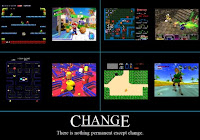My final wrap-up post from the Iowa ACRL Spring Conference is to take issue with one presentation claiming the death of reading. While the content of the presentation was fine, the speakers made the claim that reading is dying and because of the loss of reading many other societal benefits are dying as well.
Is reading really dying?
Or is it just changing?
The statistics given in the session focused on pleasure reading and fiction reading. 21% of high school students in 2004 read little or nothing for pleasure. 39% of 1st year college students in 2005 read little or nothing for pleasure.
Now, I remember my reading habits taking a dive in college because there was so much reading to do for school that I was soured to reading more. But my issue with their claim isn't with some personal experience, it is with the larger definition. Reading for pleasure happens well beyond just novels. How many lines of text do students read on a daily basis? How much of that is online or game based?
I would argue that high school and college students are reading. And they are reading a lot. The text in video games, the online guides, walkthroughs, and FAQs, the discussion boards, and game review sites. Video game players are reading and connecting all these various forms into one common experience. I'm reminded of a post from theshiftedlibrarian from way back in 2003. Video game players read - they are just not reading traditional texts.
Steven Johnson in his book "Everything Bad is Good For You" talks about this as well. Reading is judged on books because books came first. If video games or some other medium came first, it would be our benchmark. Johnson argues that it is unfair do judge reading against different mediums. Each brings unique and valuable assets.
Reading is changing. What our students are reading is changing. How we advocate reading can change a little as well.
Steven Johnson's "Everything Bad is Good For You" image via WorldCat
"Reading isn't dying, just look up from behind your book."
11:05 PM
|
Tags:
assumptions,
conferences
|
This entry was posted on 11:05 PM
and is filed under
assumptions
,
conferences
.
You can follow any responses to this entry through
the RSS 2.0 feed.
You can leave a response,
or trackback from your own site.
Subscribe to:
Post Comments (Atom)



1 comments:
I agree with you. If they are only going to count reading fiction for pleasure as their goal, their results will be off. If they counted reading emails, blogs, game walkthroughs, manuals, chat messages, text messages, comments, etc they would get a more accurate count of the reading that is occurring.
Post a Comment